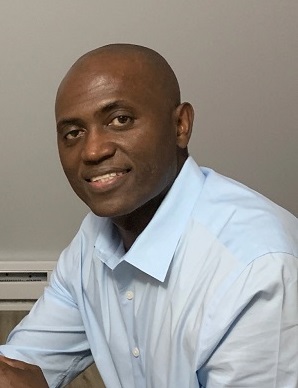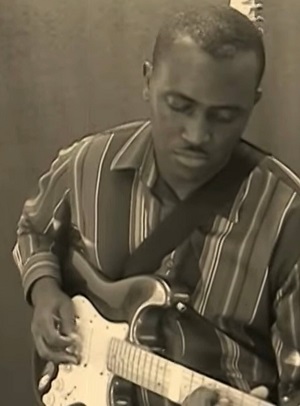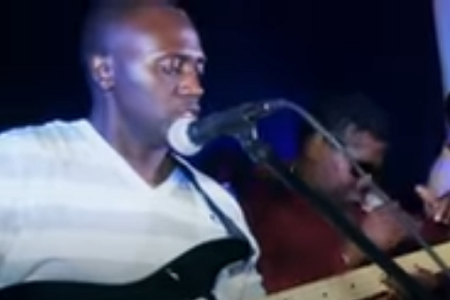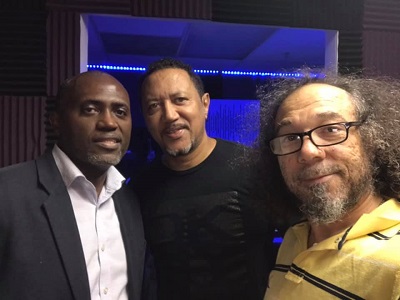Calu di Guida

Carlos Alberto Gonçalves Moreno
Musician (guitar), composer, music producer
Boa Vista, São Domingos, 1965
Calu di Guida, born in São Domingos, had early contact with music due to his familiarity with figures such as Codé di Dona, Ntóni Denti d’Oru, and Ano Nobo, the last two being compadres of his mother, who was also the cousin of Ano Nobu’s wife. The musician also remembers Rico Preta, a neighbor who played the accordion, which was the first instrument he remembers hearing (interview with Cabo Verde & a Música – Museu Virtual, May 2021). As a composer, his reference is Ano Nobo, whom he considers himself a disciple of.
Despite his proximity to these artists, his mother, as is the case in many families, had restrictions on musical practice and did not want him to play any instrument, as she considered music to be a pastime associated with the consumption of alcoholic beverages and not serious matters. Calu, therefore, recorded the tocatinas and observed. He got an idea of the guitar scale, then learned some things from Dick d’Ano Nobo (the composer’s son), and other high school colleagues, such as Kiki and Orlando Pantera. With the latter, he attended guitar lessons with Professor Kubala at Gimno Desportivo in Praia.
In 1989, Calu di Guida went to the United States, where he has lived ever since and participated in various groups, among other musical activities. He was the guitarist of the first phase of La Tour, at the invitation of Zé Galvão. The group included Zé Azancoth, Pulonga, Philipe Monteiro, Patchely, and Luís Karantonis. Calu participated in the recording of the group’s first album, which was not released.

Following that, with Galvão, who had also left La Tour, he joined Uprising (a group with various formations over time but at that time included Bardot, Julinho, Adriano, and Patchely, in addition to newcomers), performing as a guitarist and music producer. He was there from 1994 to 1997. Calu is the author of four compositions recorded by the group – “Linda,” on the album Paranoia; “Passada Rabentola,” “Melissa,” and “Manu Prera,” on the album Rabentola.
Calu di Guida was also in Os Pecos Band (with Izildo, Zito, Calú Bana, Luís, Gau Salgado, and Jorge Monteiro), and participated in the recording of the album Belêm, as a guitarist and music producer.
As a musician, he accompanied Norberto Tavares on a tour of Portugal in 1995, and between 1996 and 1997, he accompanied Chandinho Dedé on a tour that took them to Portugal, Cape Verde, the Netherlands, France, and Luxembourg. He also played with Zeca di nha Reinalda, Beto Dias, Fantcha, Gardénia Benrós, and Jacqueline Fortes, among others.
As a music producer, he worked on albums by Zé Galvão, Calú Bana, all of Gau Salgado’s albums – Salgado, Primavera, Sistema (single), Tchapu Tchacoleta, Bali Pena – and all of them recorded songs he composed, also participating as a guitarist.
In 2006, Calu di Guida produced Midju Terra, which was initially a project of his with Jorge Pimpa, with the idea of combining guitar and harmonica. Tchuni Preta sings almost all the songs, and one of them, “Bida koitadu”, a batuku, is performed by Calu. Disagreements with the vocalist led Calu to abandon the project before its completion, and the album was released as a solo album by Tchuni Preta. Six compositions are by Calu di Guida: “Midju Terra,” “Palanca,” “Três Maninho,” “Kunoti,” “Kapoku,” and “Bida koitadu.”
His compositions have been recorded by artists such as Maria de Barros, Rosa Mestre, Gutty Duarte, Calú Bana, Gau Salgado, Nataniel Simas, Zé Galvão, Desiree Fernandes, Zeca di Nha Reinalda, Vargas Monteiro, Adel Lopes, Pulonga Bita, Julinho Teixeira, Adriano Goncalves, Paulo Pires / Augusto Pires Bardot, and Patchely and Maruka Tavares. Many others remain unpublished.
Despite this long journey, Calu di Guida is not a full-time musician, dedicating himself professionally to the financial sector. Since 2021, he has been a part of the Terreru Music group, with Jacinto Fernandes, Maruka Tavares, Djinho Barbosa, and Djoy Amado.
Calu di Guida was involved in the creation of the music school in São Domingos when, at the request of the then-mayor, Franklin Tavares, he organized an event to raise funds and obtained the donation of a large number of musical instruments. The name, chosen by Calu, was Dona Mendi-D’oru, a tribute to the veteran artists of the municipality.


Songs
Amor incondicional; Angela de Praia Branca; Bali Pena; Bedja; Bon madrasta; Cabo Verdi ka ten crise; Concedju; ; 14; Di Santo; Fé; Febreru ku denti D’oru; Funana ka ten frontera; Funana Ramedi Terra; Gamboa (parceria com Calú Bana); Grogu; Impossível ka tem; Love forever; Ma Iva; Meh pa fla; Nobu, tudu sta na bu mó; Ovo D’ Ouro; Passada Rabentola; Praga tataruga; Preto é mi; Prima Vera; Salgado Nha Mana; São Domingos; Sistema; Sistema; Tempu; Pa ka txoman dodu; Trokadu Vinti Meres; Txapu txakoleta; Txuba; 24 horas; Zig zag.